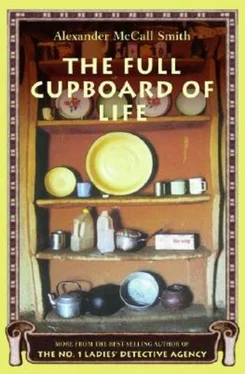Alexander Smith - The Full Cupboard of Life
Здесь есть возможность читать онлайн «Alexander Smith - The Full Cupboard of Life» весь текст электронной книги совершенно бесплатно (целиком полную версию без сокращений). В некоторых случаях можно слушать аудио, скачать через торрент в формате fb2 и присутствует краткое содержание. Жанр: Триллер, на английском языке. Описание произведения, (предисловие) а так же отзывы посетителей доступны на портале библиотеки ЛибКат.
- Название:The Full Cupboard of Life
- Автор:
- Жанр:
- Год:неизвестен
- ISBN:нет данных
- Рейтинг книги:4 / 5. Голосов: 1
-
Избранное:Добавить в избранное
- Отзывы:
-
Ваша оценка:
- 80
- 1
- 2
- 3
- 4
- 5
The Full Cupboard of Life: краткое содержание, описание и аннотация
Предлагаем к чтению аннотацию, описание, краткое содержание или предисловие (зависит от того, что написал сам автор книги «The Full Cupboard of Life»). Если вы не нашли необходимую информацию о книге — напишите в комментариях, мы постараемся отыскать её.
The Full Cupboard of Life — читать онлайн бесплатно полную книгу (весь текст) целиком
Ниже представлен текст книги, разбитый по страницам. Система сохранения места последней прочитанной страницы, позволяет с удобством читать онлайн бесплатно книгу «The Full Cupboard of Life», без необходимости каждый раз заново искать на чём Вы остановились. Поставьте закладку, и сможете в любой момент перейти на страницу, на которой закончили чтение.
Интервал:
Закладка:
“No, Mma. That’s all: no.”
“No what?”
“No. I’m not doing it.”
“What do you mean no?”
“By no, I mean no. That’s what I mean. No.”
“No? Oh.”
That, at least, was the theory. When it came actually to speaking, it might be considerably more difficult than that. But at least he had an idea of what he might say and the tone he would adopt.
MR J.L.B. MATEKONI, trying-and largely succeeding-not to think of parachutes or aeroplanes, or even the sky, started the short journey from his house to Tlokweng Road Speedy Motors. It was a journey that he had made so often that he knew every bump in the road, every gateway past which he drove, and, extraordinarily, the people whom he would often see standing at much the same place as they always stood. People like their places, Mr J.L.B. Matekoni reflected. There was that rather ragged man who used to walk about the end of Maratadiba Road, looking as if he had lost something. He was the father, he believed, of the maid who worked in one of the houses there and she had given him the spare room in her quarters. That was the right thing for a daughter to do, of course, but if Mr J.L.B. Matekoni were that man, or the daughter for that matter, he would think that the best place for a father who was slightly confused would be back in the village, or even out at the lands or at a cattle post. In the village he would be able to stand in one spot and watch everything happen without his moving about. He could watch cattle, which was very important for older people, and a good hobby for older men. There was a great deal to be learned just by watching cattle and noting their different colours. That would have kept that man busy.
And then, just round the corner, on Boteli Road, on Fridays and Saturdays one might see a very interesting car parked under the shade of a thorn tree. The car belonged to the brother of a man who lived in one of the houses on Boteli Road. He was a butcher from Lobatse, who came up to Gaborone for the week-ends, which started, for him, on Friday morning. Mr J.L.B. Matekoni had seen his butchery store down in Lobatse. It was large and modern, with a picture of a cow painted on the side. In addition, this man owned a plastering business, and so Mr J.L.B. Matekoni imagined that he was a fairly wealthy man, at least by the standards of Lobatse, if not the standards of Gaborone. But it was not his prosperity which singled him out in the eyes of Mr J.L.B. Matekoni; it was the fact that he had such a fine car and had clearly taken such good care of it.
This car was a Rover 90, made in 1955, and therefore very old. It was painted blue, and on the front there was a silver badge showing a boat with a high prow. The first time he had driven past it, Mr J.L.B. Matekoni had stopped to examine it and had noted the fine red leather seats and the gleaming silver of the gear lever. These external matters had not impressed him; it was the knowledge of what lay within: the knowledge of the 2.6-litre engine with its manual transmission and its famous free wheel option . That was something one would not see these days, and indeed Mr J.L.B. Matekoni had once brought his apprentices to look at the car, from the outside, so that they could get some sense of fine engineering. He knew of course that there was very little chance of that, but he tried anyway. The apprentices had whistled, and the older one, Charlie, had said, “That is a very fine car, Rra! Ow!” But no sooner had Mr J.L.B. Matekoni turned his back for a moment than that very same apprentice had leant forward to admire himself in the car’s wing mirror.
Mr J.L.B. Matekoni had realised then that it was hopeless. Between these young men and himself there was a gulf that simply could not be crossed. The apprentice had recognised that it was a fine car, but had he really understood what it was that made it fine? He doubted that. They were impressed with the spoilers and flashy aluminium wheels that car manufacturers added these days; things which meant nothing, just nothing, to a real mechanic like Mr J.L.B. Matekoni. These were the externals, the outside trim designed, as often as not, to impress those who had no knowledge of cars. For the real mechanic, mechanical beauty lay in the accuracy and intricacy of the thousand moving pieces within the breast of the car: the rods, the cogs, the pistons. These were the things that mattered, not the inanimate parts that did nothing but reflect the sun.
Mr J.L.B. Matekoni slowed down and gazed at the fine car under the thorn tree. As he did so, he noticed, to his alarm, that there was something under the car-something that a casual observer might not notice but which he would never miss. Drawing up at the side of the road, he switched off the engine of his truck and got out of the cab. Then, walking over to the blue Rover, he went down on his hands and knees and peered at the dark underbelly of the car. Yes, it was as he thought; and now he went down on his stomach and crawled under the car to get a better view. It took him only a moment to realise what was wrong, of course, but the sight made him draw in his breath sharply. A pool of oil had leaked out onto the ground below the car and had stained the sand black.
“What are you doing, Rra?”
The sound surprised Mr J.L.B. Matekoni, but he knew better than to lift his head up sharply; that was the sort of thing that the apprentices kept doing. They often bumped their heads on the bottom of cars when the telephone rang or when something else disturbed them. It was a normal human reaction to look up when disturbed, but a mechanic learned quickly to control it. Or a mechanic should learn that quickly; the apprentices had not done so, and he suspected that they never would. Mma Makutsi knew this, of course, and she had once rather mischievously called out Charlie’s name when he was underneath a car. “Charlie,” she had cried, and there had followed a dull thump as the unfortunate young man had sat up and hit his head on the sump of the car. Mr J.L.B. Matekoni had not really approved of this little joke, but he had found it difficult not to smile when he caught her eye. “I was just checking up that you were all right,” shouted Mma Makutsi. “Be careful of your head down there. That brain needs to be looked after, you know.”
Mr J.L.B. Matekoni wriggled his way out from under the car and stood up, dusting his trousers as he did so. As he had thought, it was the butcher himself, a corpulent man with a thick neck, like the neck of a bull. It was obvious to anyone, from the very first glance, that this was a wealthy man, even if they did not know about the butchery and the plastering business, nor indeed about this wonderful car with its silver badge.
“I was looking at your car, Rra,” he said. “I was underneath it.”
“So I see,” said the butcher. “I saw your legs sticking out. When I saw that, I knew that there was somebody under my car.”
Mr J.L.B. Matekoni smiled. “You must be wondering what I was doing, Rra.”
The butcher nodded. “You are right. That is what I was wondering.”
“You see, I am a mechanic,” said Mr J.L.B. Matekoni. “I have always thought very highly of this car. It is a very good car.”
The butcher seemed to relax. “Oh, I see, Rra. You are one who understands old cars like this. I am happy for you to go back under and look.”
Mr J.L.B. Matekoni acknowledged the generosity of the offer. He would go back under the car, but it would be more than out of mere curiosity. If he went back, it would be on a mission of repair. He would have to tell the butcher of what he had seen.
“There is oil, Rra,” he began. “Your car is leaking oil.”
The butcher lifted up a hand in a gesture of tiredness. There was always oil. It was a risk with old cars. Oil; the smell of burning rubber; mysterious rattles: old cars were like the bush at night-there were always strange sounds and smells. He kept taking the car back to the garage and getting them to fix this problem and that problem, and yet these problems always recurred. And now here was another mechanic-one he did not even know-who was talking about oil leaks.
Читать дальшеИнтервал:
Закладка:
Похожие книги на «The Full Cupboard of Life»
Представляем Вашему вниманию похожие книги на «The Full Cupboard of Life» списком для выбора. Мы отобрали схожую по названию и смыслу литературу в надежде предоставить читателям больше вариантов отыскать новые, интересные, ещё непрочитанные произведения.
Обсуждение, отзывы о книге «The Full Cupboard of Life» и просто собственные мнения читателей. Оставьте ваши комментарии, напишите, что Вы думаете о произведении, его смысле или главных героях. Укажите что конкретно понравилось, а что нет, и почему Вы так считаете.












